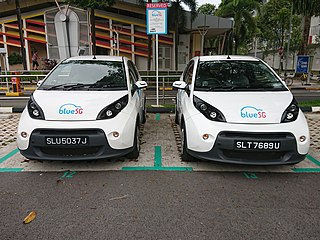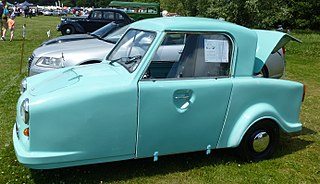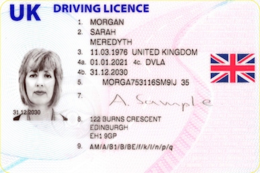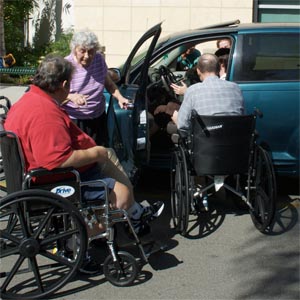Vehicle insurance is insurance for cars, trucks, motorcycles, and other road vehicles. Its primary use is to provide financial protection against physical damage or bodily injury resulting from traffic collisions and against liability that could also arise from incidents in a vehicle. Vehicle insurance may additionally offer financial protection against theft of the vehicle, and against damage to the vehicle sustained from events other than traffic collisions, such as keying, weather or natural disasters, and damage sustained by colliding with stationary objects. The specific terms of vehicle insurance vary with legal regulations in each region.

In the United States, a car dealer may specialize in used vehicles, or be a franchised dealership, which is a retailer that sells new and used cars. In most cases franchised dealerships include certified pre-owned vehicles, employ trained automotive technicians, and offer financing. In the United States, direct manufacturer auto sales are prohibited in almost every state by franchise laws requiring that new cars be sold only by dealers.

Carsharing or car sharing or car clubs (UK) is a model of car rental where people rent cars for short periods of time, often by the hour. It differs from traditional car rental in that the owners of the cars are often private individuals themselves, and the carsharing facilitator is generally distinct from the car owner. Carsharing is part of a larger trend of shared mobility.
Usage-based insurance (UBI) also known as pay as you drive (PAYD) and pay how you drive (PHYD) and mile-based auto insurance is a type of vehicle insurance whereby the costs are dependent upon type of vehicle used, measured against time, distance, behavior and place.

A mobility scooter is a mobility aid equivalent or auxiliary to a wheelchair but configured like a motorscooter. When motorized they are commonly referred to as a power-operated vehicle/scooter or electric scooter as well. Non-motorized mobility scooters are less common, but are intended for the estimated 60% of wheelchair users who have at least some use of their legs.

The Invacar was a small single-seater vehicle designed for use by disabled drivers, and distributed for free.
A car rental, hire car, or car hire agency is a company that rents automobiles for short periods of time, generally ranging from a few hours to a few weeks. It is often organised with numerous local branches, and primarily located near airports or busy city areas and often complemented by a website allowing online reservations.

A disabled parking permit, also known as a disabled badge, disabled placard, handicapped permit, handicapped placard, handicapped tag, and "Blue Badge" in the European Union, is displayed upon parking a vehicle permitting the operator of a vehicle to special privileges regarding the parking of that vehicle. These privileges include parking in a space reserved for persons with disabilities, or in some situations, permission to park in a time-limited space for a longer time, or to park at a meter without payment.
Vehicle leasing or car leasing is the leasing of a motor vehicle for a fixed period of time at an agreed amount of money for the lease. It is commonly offered by dealers as an alternative to vehicle purchase but is widely used by businesses as a method of acquiring vehicles for business, without the usually needed cash outlay. The key difference in a lease is that after the primary term the vehicle has to either be returned to the leasing company or purchased for the residual value.

Driver licences in Australia refer to the official permit required for a person to legally drive a motor vehicle in Australia. The issue of driver licenses, alongside the regulation and enforcement of road use, are all managed by state and territory governments.

In the United Kingdom, a driving licence is the official document which authorises its holder to operate motor vehicles on highways and other public roads. It is administered in England, Scotland and Wales by the Driver and Vehicle Licensing Agency (DVLA) and in Northern Ireland by the Driver & Vehicle Agency (DVA). A driving licence is required in England, Scotland, and Wales for any person driving a vehicle on any highway or other "road", as defined in s.192 Road Traffic Act 1988, irrespective of the ownership of the land over which the road passes. Similar requirements apply in Northern Ireland under the Road Traffic Order 1981. As long as Great Britain and Northern Ireland remains within the European Union, a UK driving licence is a European driving licence. The EU flag will be removed from UK driving licences when the transition period ends on 31 December 2020.
Motability is a charity in the United Kingdom. It oversees the Motability Scheme which is intended to enable disabled people, their families and their carers to lease a new car, scooter or powered wheelchair, using their disability benefit. Currently, the Motability scheme has more than 650,000 customers.
Disability Living Allowance (DLA) is a social security benefit in the United Kingdom paid to eligible claimants who have personal care and/or mobility needs as a result of a mental or physical disability. It is tax-free, non-means-tested and non-contributory. The benefit was established by the Social Security Contributions and Benefits Act 1992, integrating the former benefits Mobility Allowance and Attendance Allowance and introducing two additional lower rates of benefit. Prior to 2013 it could be claimed by UK residents aged under sixty five years. However, the benefit was phased-out for the majority of claimants between 2013 and 2015 and replaced by a new Personal Independence Payment. DLA can still be claimed by children under sixteen and can still be received by existing claimants who were aged sixty five or over on 8 April 2013.
Statistics show that per mile driven older drivers are over-represented in fatal accidents. Due to their physical frailty they are more likely to be injured in an accident and more likely to die of that injury. When frailty is accounted for and older drivers are compared to younger persons driving the same amount the over-representation disappears. According to the Insurance Institute for Highway Safety, a senior citizen is more likely than a younger driver to be at fault in an accident in which they are involved. The most common violations include failure to obey traffic signals, unsafe turns and passing, and failure to yield the right of way.
Vehicle insurance, in the United States and elsewhere, is designed to cover the risk of financial liability or the loss of a motor vehicle that the owner may face if their vehicle is involved in a collision that results in property or physical damage. Most states require a motor vehicle owner to carry some minimum level of liability insurance. States that do not require the vehicle owner to carry car insurance include Virginia, where an uninsured motor vehicle fee may be paid to the state, New Hampshire, and Mississippi, which offers vehicle owners the option to post cash bonds. The privileges and immunities clause of Article IV of the U.S. Constitution protects the rights of citizens in each respective state when traveling to another. A motor vehicle owner typically pays insurers a monthly fee, often called an insurance premium. The insurance premium a motor vehicle owner pays is usually determined by a variety of factors including the type of covered vehicle, marital status, credit score, whether you rent or own a home, the age and gender of any covered drivers, their driving history, and the location where the vehicle is primarily driven and stored. Most insurance companies will increase insurance premium rates based on these factors, and less frequently, offer discounts.
Driver rehabilitation is a type of rehabilitation that helps individuals facing challenges caused by a disability or age to achieve safe, independent driving or transportation options through education or information dissemination. Professionals who work in the field use adaptive equipment and modified vehicles to help people attain independent transportation.
Personal Independence Payment is a welfare benefit in the United Kingdom that is intended to help adults with the extra costs of living with a long-term health condition or a disability.

A driver's license is an official document, often plastic and the size of a credit card, permitting a specific individual to operate one or more types of motorized vehicles, such as a motorcycle, car, truck, or bus on a public road.

An adapted automobile is an automobile adapted for ease of use by disabled people. Automobiles, whether a car or a van, can be adapted for a range of physical disabilities.
Increases in the use of autonomous car technologies are causing incremental shifts in the responsibility of driving, with the primary motivation of reducing the frequency of traffic collisions. Liability for incidents involving self-driving cars is a developing area of law and policy that will determine who is liable when a car causes physical damage to persons or property. As autonomous cars shift the responsibility of driving from humans to autonomous car technology, there is a need for existing liability laws to evolve in order to fairly identify the appropriate remedies for damage and injury. As higher levels of autonomy are commercially introduced, the insurance industry stands to see greater proportions of commercial and product liability lines, while personal automobile insurance shrinks.








